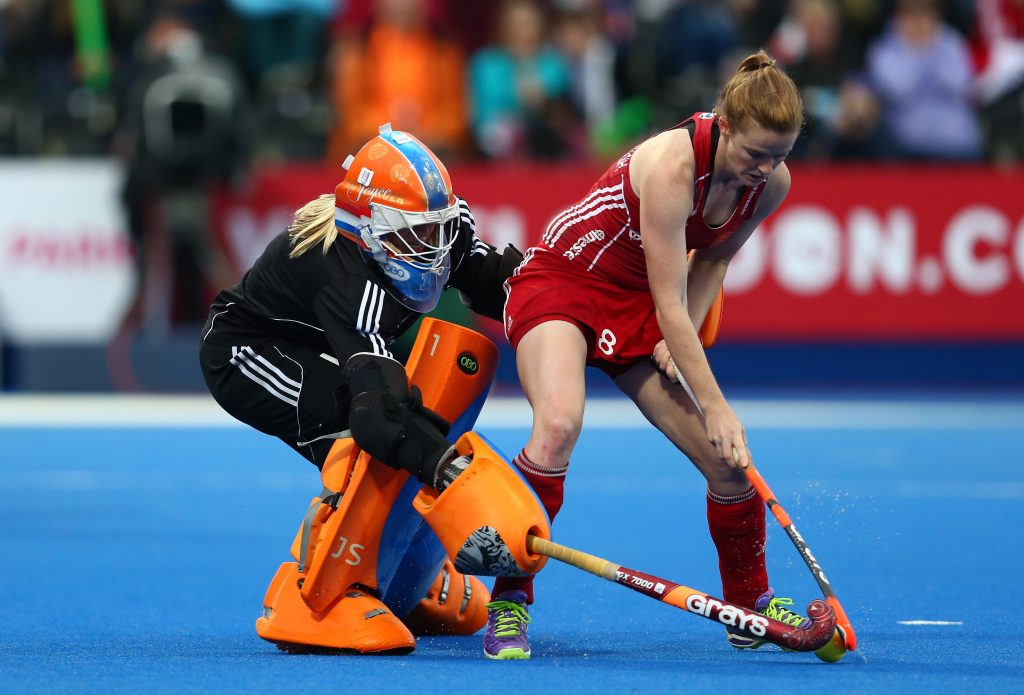World Mental Health Day: Helen Richardson-Walsh on the support she received from the EIS
To mark World Mental Health Day (Tuesday 10 October 2017), and this year’s theme of workplace wellbeing, Olympic gold medal winning hockey star Helen Richardson-Walsh recalls her experiences of dealing with mental health problems and how she sought help to overcome them.
For 17 years I was a player for Team GB and England Hockey, that’s a long time to be operating in a competitive and stressful environment. As with most athletes I’ve had injury problems but a six-month period between London 2012 the 2016 Olympics in Rio was the most difficult and challenging of my career.
My own personal problems with mental health actually date back to 2008. I remember being emotional a lot, I’d find myself crying and I’d feel down and I didn’t really know why. There didn’t seem to be any apparent reason. That was a moment in time where I thought that this shouldn’t be happening.
In 2008 I made contact with the team doctor, which took a bit of courage at the time. He was very good, understanding and empathetic and made me feel at ease. He recommended follow-up actions, which I didn’t act on. What it meant was that I didn’t get to the bottom of the issue and inevitably the problems came back.
The catalyst came in 2013-2014 when I faced serious injury problems. I missed the World Cup in May 2014 and had double back surgery leading up to that tournament.
If you speak to any elite athlete they’ll tell you being injured can be a dark and often lonely place. I was low. Missing out on the World Cup was devastating – you’re always working towards something in sport and having that taken away is painful and crushing.

My own situation was more than just disappointment though. I was questioning who I was and everything about me with my confidence and self esteem really suffering. People often talk about a dark cloud and not seeing the point of getting out of bed and that’s where I was, which went on for months.
The staff around me who I saw on a daily basis, from the physios, strength and conditioning coaches and Performance Lifestyle Advisors, although not knowing the information, all helped and were supportive in their own way, but I needed to access more specialised help, as it was clear to me that this wasn’t going to pass of it’s own accord.
I sought help again, initially speaking to the Performance Lifestyle advisor that works with GB Hockey and then to one of our Doctors who told me that specialist help was available and referred me to the Mental Health Referral Programme (MHRP).
Established by the EIS in 2014, the MHRP provides specialist care services to elite athletes that are struggling with mental health issues. It is available to all athletes on World Class Performance Programmes and enables them to access specialist psychiatric and clinical psychology support services to address a wide range of mental health and wellbeing issues.
Through the programme I was referred to the Priory Hospital in Roehampton as an outpatient for a series of appointments over the space of six months or so. I’m grateful for that support from the EIS, it took me a few months to start to get back to feeling myself again.
The specialists I saw were away from the hockey world and my daily life and that was critical. They brought a fresh perspective to my issues allowing me to gradually see the light at the end of the tunnel, slowly but surely I started to feel like my old self. Everyone knows the success that eventually followed in Rio for myself as part of the GB hockey team, I think what I’d gone through made it even more satisfying.

Having that option available to me to be referred to the Priory was so significant, it’s difficult to know where I would’ve been without the help I received. During my time as an athlete there has been a definite improvement in the structure and level of support available regarding mental health.
Knowing that this supportive system is there was a massive comfort for me, unfortunately though athletes won’t necessarily pay attention until they need help. Raising awareness of the referral programme therefore is critical in catching problems early.
I’m sharing my story to show my support for World Mental Health Day. Whatever profession you’re in: whether you work in an office, a building site or have the privilege to be an elite athlete, your mental health is vital to your general wellbeing and happiness. My advice to any person or athlete who feels they need help is to find someone they can trust and open up to them, it made all the difference to me.
We want to get to a place where people don’t feel afraid to ask for help, where they feel comfortable bringing up these problems and knowing there’s options and support available.
Mental illnesses don’t care who you are, where you’ve come from or what you’ve achieved, so you need to show them the respect they deserve.